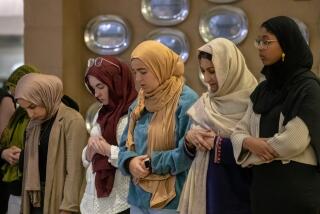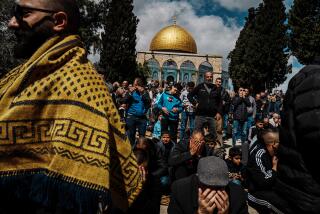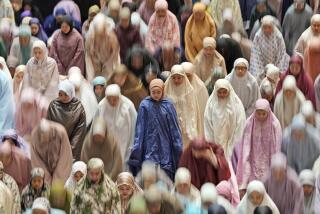Teenagers Form Link From Koran to U.S.
- Share via
Each evening for a month, a handful of teenage boys across Southern California will recite from memory a chapter of the Koran -- Islam’s holy book -- to crowds gathered at mosques. Just one of these evening prayers can take up to 90 minutes.
By the end of the 30 days of Ramadan, the Islamic holy month that began at sundown Tuesday, the boys will have chanted in ancient Arabic all 6,391 verses of the Koran.
This doesn’t just mark an impressive feat of mental agility, local Muslim leaders say. It also signals the emergence of the next generation of Islamic leadership in America: native-born Muslims who are devout enough to spend years committing the Koran to memory but who are also able to blend in easily with the local culture.
Outside the Islamic Society of Orange County mosque in Garden Grove last week, Nasir Jiwa, 17, looked like any other U.S. teenager. Dressed in jeans and a long-sleeve shirt, he rode a scooter and joked with friends.
Tonight, Nasir will be leading prayers at the Islamic Society of Fountain Valley mosque.
“We are the next generation,” said Nasir, a student at Orange Coast College who said he started to memorize the Koran five years ago. “I feel like this is my country and this is my religion. Of course, I feel a sense of responsibility.”
Ramadan marks the revelation of the Koran to the prophet Muhammad. During the monthlong observance, Muslims fast from sunrise to sunset, say additional daily prayers, give to charity and, on the last and holiest day, celebrate Eid al-Fitr, or Feast of the Fast-Breaking.
There are no statistics on how many Muslim teenagers in the United States have memorized the Koran in recent years, an achievement Islamic experts say is accomplished by only about 1% of the followers of Islam. But local officials estimate about two dozen Southern California teenagers can recite the holy book by heart, making them eligible to say the extended prayers of Ramadan.
“It’s very heartwarming to see Muslims born and raised in America become part of the leadership and taking us into new directions,” said Sabiha Kahn, a spokeswoman for the Southern California chapter of the Council for American-Islamic Relations.
For Muneeb Baig, 16, this will be his fourth year of leading prayers at the Garden Grove mosque. He finished memorizing the Koran at age 13, after three years and four to five hours a day of study. In preparation for Ramadan, he has reviewed the text for up to 90 minutes each day. This kind of religious devotion led to a decision by him and his family to attend school at home, freeing up time for further Islamic studies.
“I memorized the Koran, but I haven’t become a scholar of the religion yet,” said the soft-spoken Muneeb.
Faiz Dadabhoy, 17, of Diamond Bar said he was moved to memorize the Koran after hearing a younger Muslim lead Ramadan prayers three years ago and envisioning himself in that role.
“I was pretty motivated by it,” said Faiz, who will recite the Koran during Ramadan at the Islamic Center of San Gabriel Valley in Walnut. “It’s good to have people born in the community [lead prayers]. They know English better, and they know the culture better.”
All the teenagers are quick to underscore their respect of the elder leaders of the mosques. Most are immigrants who memorized the Koran in their homelands. But they agree that their generation’s advantage is that it can better integrate a U.S. minority religion into the mainstream.
The young leaders also can relate to the special problems young Muslims face in this society -- including prejudice, fashion challenges and dating.
“Young kids have people to identify with,” Kahn said. “They are people who went through the same things as us and rose above it all” to remain true to their Islamic values.
*
(BEGIN TEXT OF INFOBOX)
Ramadan
Ramadan is the Muslim holy month that celebrates the revelation of the Koran, Islam’s holy book, to the prophet Muhammad. The month is devoted to sacrifice, community, introspection and charity. The Ramadan fast -- sawm -- during which adults abstain from eating and drinking during the day, is one of the five pillars, or basic duties, of Islam. The other pillars are the shahada, or profession of faith; the salat, or formal prayer; the zakat, a tithing for charity; and the hajj, a pilgrimage to Mecca.
*
Source: Council on American-Islamic Relations
More to Read
Sign up for Essential California
The most important California stories and recommendations in your inbox every morning.
You may occasionally receive promotional content from the Los Angeles Times.










